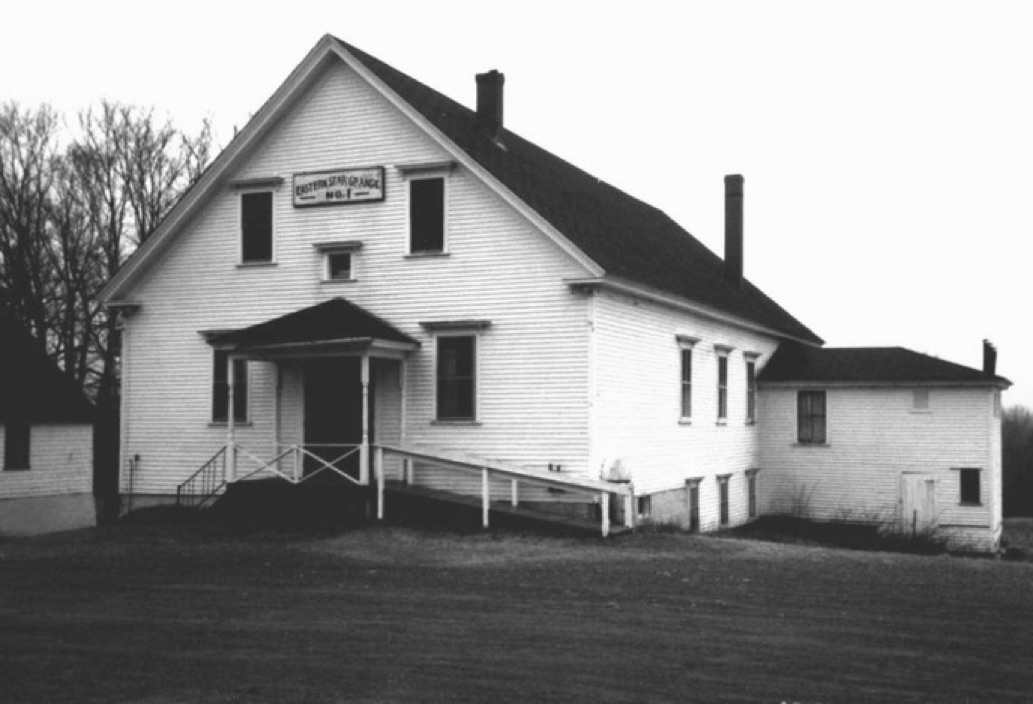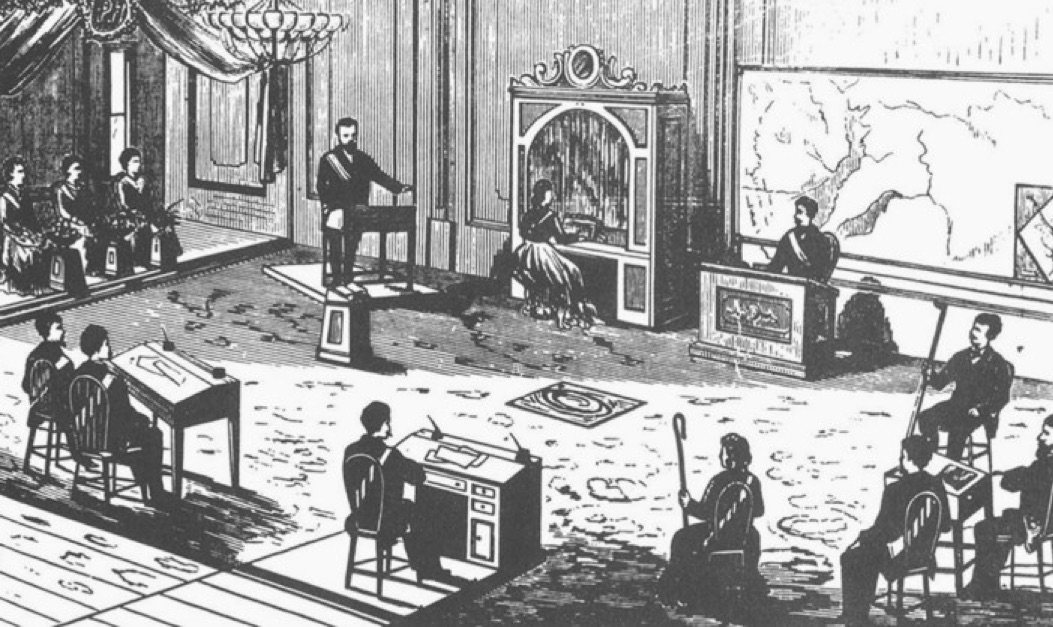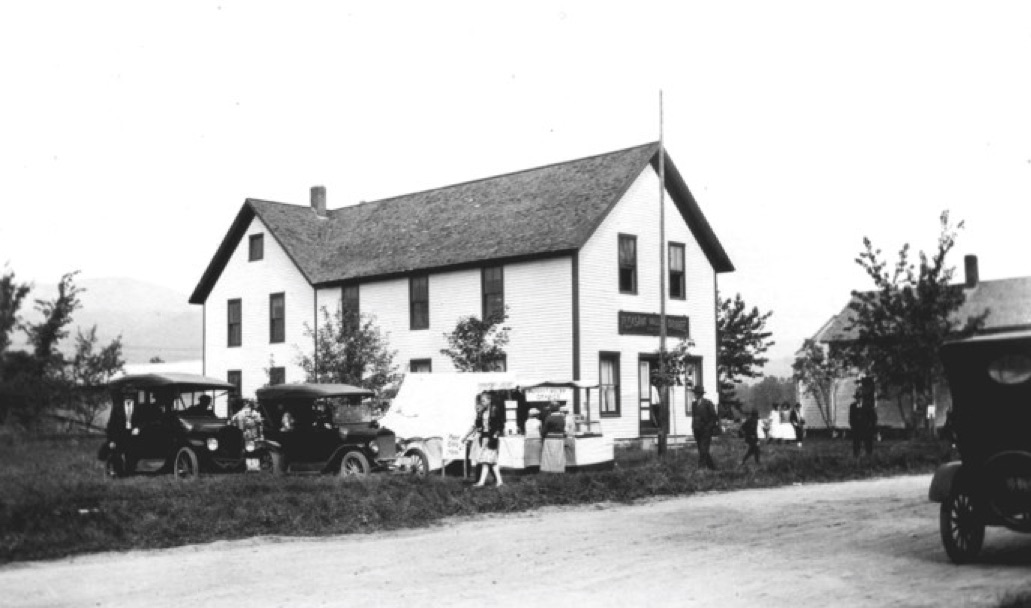To Improve the Farmer's Lot: The Grange in Maine
Title
Creator
Identifier
Text Record
Subjects
Collection
Full Text
To Improve the Farmer's Lot: The Grange in Maine
by Stanley R. Howe
For over half a century, beginning in the 1870s, the Grange in Maine numbered some 50,000 members in more than 400 locations throughout the State. Active on behalf of Maine's rural populace, the Grange lobbied the Maine Legislature to improve the quality of education in the State's public and vocational schools, and to reform the taxation system to make it more equitable. Additionally, as the first major organization to grant women equal rights, the Grange provided an opportunity for rural females to escape the drudgery of the farm home so they could take advantage of the educational and social aspects of the Order. The following article by Dr. Stanley R. Howe is based on his book "A Fair Field and No Favor": A Concise History of the Maine State Grange; the author has served as Historian for the Maine State Grange for a number of years.
The Grange and Its Origins
The “Order of the Patrons of Husbandry,” or the “Grange,” was founded in 1867 at Washington, D.C., by seven men under the leadership of Oliver Hudson Kelley, a civil servant who had been asked by the Commissioner of Agriculture to travel the war-ravaged South after the Civil War. Kelly was struck by the devastation, and conceived of a society of farmers that would bind up the Nation’s wounds by promoting fraternal and brotherly love. Kelley and the other founders were also aware that the proliferation of railroads, mass production of farm machinery, and introduction of middlemen or “monopolists”—who made a living handling or marketing the farmers’ products—were causing a shift in the country’s economic and political power from the countryside to the city. The Grange, and other fraternal orders like it, created a sense of stability in a changing world, and helped its members come to terms with these shifts. Kelley’s niece, Caroline A. Hall, a prominent feminist of the era, successfully lobbied the founders to give women equal rights within the new Order.
An agricultural fraternal order with pageantry, rituals, passwords and secrecy common to other fraternal societies of the mid- to late-19th century, the Grange provided a broadening of rural experience, with males and females fourteen years of age and older sharing equally in the work of the Order. In addition, the strong social and educational aspects of Grange programs improved the lot of the nation’s rural farm population.
Before the Grange: Maine Agriculture and the Farmer’s Club Movement
Agriculture in Maine has always been a difficult proposition, even in the best of times. Since the 1600s, tillers of the earth have had to contend with a difficult climate (in 1816, there was a killing frost each month), rocky soils (except in the rolling hills of northern Maine and on level river “intervales”), and uncertain prospects due to transportation, markets, and pests. During the 1830s and 1840s, the American West was opened up and became a competitor of Maine agricultural production; such competition resulted in diversification and reform on Maine farms. By the mid-19th century, rivalry between so-called “book farmers” (those advocating farming based on sound scientific principles) and “dirt farmers” (those who practiced traditional farming, learned from their forebears) became more pronounced. This tension continued until organizations such as the “Farmer’s Club” and the Grange made more information available, and the education of Maine farmers became an established tenet of success in farming.
Agricultural societies first appeared in Maine in the 1790s and proliferated in the 19th century. In the 1850s, Farmer’s Clubs emerged in Maine (the first was organized in 1853 at Bethel) and flourished for the next three decades. After the Civil War, Farmer’s Clubs experienced a brief revival, the Maine Legislature having passed a law requiring part of the subsidy agricultural societies received from the State be spent promoting Farmer’s Clubs. So successful was this effort that by the 1870s nearly a hundred such clubs existed in Maine actively promoting agrarian interests. The Farmer's Club movement in Maine gave way to the Grange during the 1870s and 1880s, mainly because of the educational, financial and social benefits provided to entire farm families by the latter organization.
The Strong and Faithful Tie of Agriculture: The Beginnings of the Grange in Maine
The earliest appearance of the Grange in Maine actually predates the founding of the first Subordinate Grange in the State at Hampden in 1873; most sources agree that Amasa K. Walker of Hampden was inducted into the new Order while holding a government position in Washington, D.C. During the next quarter century, hard times brought on by competition from the West and an out-migration of Maine’s youth from the farm were counteracted, to a degree, by the strong social and educational aspects of Grange programs, as well as by its skilled local leadership. Under the expert direction of State Masters Nelson Ham, Frederick Robie, and Rufus Prince—among others—the Grange took an activist position on countless state and national issues affecting farmers. For example, the Grange urged more uniform textbooks in Maine’s public schools, the abolition of the district school system, more generous appropriations for the State College of Agriculture (at Orono), cabinet status for the U.S. Department of Agriculture, curbs on the powers of railroads and monopolies, and a graduated federal income tax.

Eastern Star Grange No. 1 in Hampden, near Bangor
In 1885, State Master Frederick Robie, who had been elected Governor of Maine three years earlier, proudly pointed out that the Grange’s growth in Maine was the best in the nation. By 1900, 356 Subordinate Granges had been established throughout the State, with the majority organized in just a two-year period—between 1874 and 1876. Little wonder, then, that during this period New England became known as the “Gibraltar of the Grange.”
The Importance of Legislation
Members of the Grange in Maine have long supported certain state and national causes by advocating legislative action. For example, early in the 20th century the Grange championed prohibition and Rural Free Delivery, while opposing the creation of the State Highway Commission, the fire warden system and movement of the state capital to Portland. During the era of “Progressivism,” the Maine State Grange backed such progressive legislation as the direct primary, recall and referendum, and voting rights for women.
Increasingly focused on the quality of rural life, the Grange supported the establishment of the Farm Bureau, the Extension Service, the Maine Federation of Agricultural Organizations and the Maine Experiment Station; by doing so, the Grange diminished its role in educating Maine farmers by emphasizing scientific methods of agriculture. In fact, as these other organizations evolved, the Grange’s cooperative functions declined and its social and intellectual activities grew, bringing it closer to the organization envisioned by founder Oliver Hudson Kelley.
Rituals and Regalia
For all members of the Grange, and particularly those in Maine, the ritualism of the Order has long possessed a unique significance and appeal. A vital part of regular procedures, meetings, and activities, the rituals dramatize the beauty and importance of the family, home, community, faith, country, and agriculture. From the beginnings of the Order, Grange “work” reflected the everyday experiences of the farmer, while binding members together across the country. These cohesive fraternal ties have strengthened the Grange on the local level and enhanced its prestige on the state and national level.

The basis for Grange rituals lies in several areas, but chiefly in the Masonic Order, the Bible, the old English estate system, and in Greek and Roman mythology. From these sources came the first four degrees (based on the four seasons of the year), the foundation lessons emphasizing Faith, Hope, Charity and Fidelity, and the ritual stations of three graces, Ceres, Pomona, Flora, plus Gate Keeper, Overseer, Steward, Chaplain, Assistant Steward, Lady Assistant Steward, Secretary, Treasurer, Lecturer and Master. The use of the word “Grange” to represent the Order originates in the term applied to those parts of English estates that were set apart as working farms.
Sisters of the Order: Women and the Grange
The dramatic action of the Founders in giving women full equality and a vote placed the Grange in a leadership position among America’s fraternal organizations when it was formed in 1867. Early sessions of the Grange declared for women’s right to vote, and it was Grange support and influence which assisted greatly in bringing about equal suffrage for men and women in this country. (It’s also worth noting that Caroline Hall, niece of Oliver Hudson Kelley, was officially recognized as an “equal” Founder of the Grange in 1892.)
In Maine, women’s roles in the State Grange did not assume a particular focus until 1886, when the Thirteenth Annual Session established a Household Economy Committee (now the “Committee on Women’s Activities”). Among the programs advanced by this Committee over the past century has been music in public schools, the organization of Juvenile Granges, assistance for the less fortunate, character building, and improvement of Grange hall kitchens. During World War II, Grange women made notable contributions to Civil Defense, the Red Cross and Victory Gardens. In the post-war period, the Committee took on the job of helping to pay off the mortgage on the State Grange Headquarters in Augusta. This Committee has also had a long tradition of working closely with the Farm Bureau, Extension Service and 4-H Clubs.
Harvesters and Gleaners All: The Maine Grange in the 20th Century
Throughout the first half of the 20th century, the Grange in Maine sustained an impressive level of activity, with over 400 Subordinate Grange organizations retaining their role as centers of village life. Members of the Order responded to state and national concerns with the same degree of commitment shown during the 19th century. For instance, some 2400 Maine Grangers answered the call to arms during World War I. During the Depression years, the Grange offered inexpensive entertainment—including plays, tableaus, readings and music—and the fellowship of suppers preceding meetings. And during the Second World War, Grange men and women not only served their country with honor, but the State Grange strongly advocated the purchase of war bonds and the collection of strategic materials such as rubber and metals.
In the years immediately following World War II, Grange membership in Maine was made up less frequently of farmers and their families, reflecting the decreasing number of farms in the State. In time, the Grange became more interested in community service and social activity, while still passing resolutions and following up with extensive lobbying efforts. With the National Grange dominated by Midwesterners, members in Maine focused increasingly on issues closer to home as they sought a renewed sense of purpose. With this objective in mind, Maine Grangers pledged themselves to a number of new and useful projects, including financial support of the former Maine Conservation School at Bryant Pond, establishment of a Committee on Deaf Activities, the organization of hay relief projects to assist out-of-state farmers, and the publication of a revitalized Grange newspaper (The Maine Granger).

Pleasant Valley Grange Fair, West Bethel, 1926
The Grange in Maine Today
Grange membership in Maine peaked in the 1950s, when more than 62,000 residents belonged to the Order. Not surprisingly, the transformation of American agriculture, the popularity of television, changes in insurance laws, increased opportunities for socialization outside fraternal orders and other developments have resulted in a dramatic decline in Subordinate Granges (down to 160 in 2008) and membership (approximately 10% of its peak number) in Maine today. The main reason for the Grange’s existence—“to improve the farmer’s lot”—has been replaced by a variety of causes less crucial to the country’s general welfare, but nevertheless of widespread significance.
In retrospect, the Grange’s most important contribution appears to be the light it brought to countless rural families and isolated neighborhoods throughout Maine. Through its literary programs, sponsorship of libraries, debates, plays, suppers, dances and other social occasions, the Grange nourished and enriched otherwise bleak lives in ways that are difficult to understand in today’s “global village.” The continued existence of the Grange will likely depend on whether present and future generations rediscover the simplicity and eternal values espoused by the Order over the past century-and-a-half. In an increasingly turbulent and unpredictable world, the wisdom embodied in the Grange’s seven degrees may supply a quaint yet solid foundation for those seeking fulfillment in a post-industrial age.
